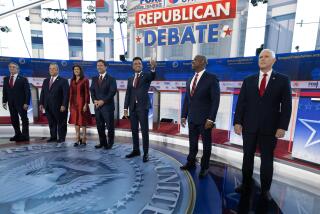Laxalt Differs With President’s Policies
LITTLE ROCK, Ark. — Republican presidential aspirant Paul Laxalt told Southern lawmakers Monday that President Reagan’s trade and energy policies are not working, and he also knocked the detached management style that critics say allowed the Iran- contra affair to develop in the Administration.
“I don’t know if I’m nosier and less secure than Ronald Reagan, but I’ve just got to know what’s going on in my shop,” the former senator from Nevada told legislators from 15 Southern states.
Laxalt’s criticisms were the only discordant notes in an otherwise strong endorsement of Reagan’s conservative agenda.
Laxalt acknowledged that his audience, 500 members of the Southern Legislative Conference, was largely Democratic, but he said his conservative credentials should put him in good standing with Southern voters.
“I’m not only a Republican, but I’m a conservative,” said Laxalt, who is a close friend of the President. “I suspect that I’ve got a little company here today.”
Laxalt noted that the South’s textile industry has been hit hard by competition from imports, and said the solution lies in negotiating tough bilateral trade agreements with other countries. He called for new tax incentives to help the oil-producing states, but opposed an oil import tax.
Laxalt also had barbs for his leading rival for the 1988 GOP nomination, Vice President George Bush. He told reporters that Bush’s campaign is looking “somewhat thin” and likened it to Walter F. Mondale’s ill-fated effort in 1984.
The legislators also heard from Democratic presidential candidate Sen. Paul Simon of Illinois, who said that he understands rural America and offers his party the best chance of “drawing over and pulling Republicans and independents” into the Democratic fold.
The nonpartisan legislative conference helped establish the regional presidential primary that will take place next March 8, when more than one-quarter of both the Democratic and Republican convention delegates will be selected.
Simon said the outcome of the Southern primary was likely to be divided, with no one candidate emerging as a leader, because there are so many contests.
More to Read
Get the L.A. Times Politics newsletter
Deeply reported insights into legislation, politics and policy from Sacramento, Washington and beyond. In your inbox three times per week.
You may occasionally receive promotional content from the Los Angeles Times.










